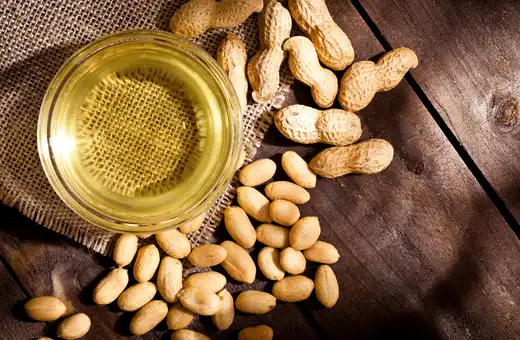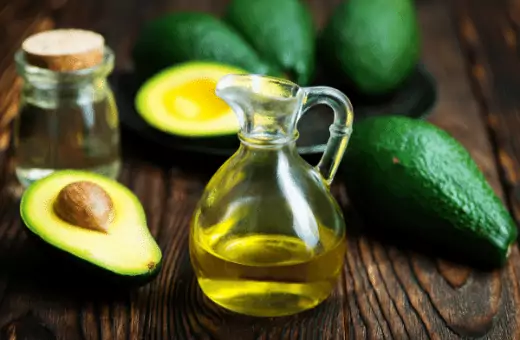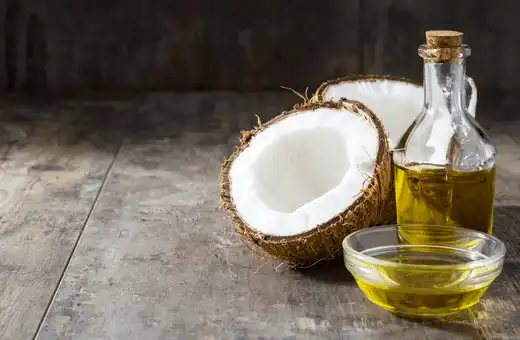If you’re looking for a substitute for corn oil in your baking recipes, you have a few different options. Olive oil, canola oil, or vegetable shortening are all excellent substitutes.
Each has its own unique flavor and properties that will work well in specific recipes.
Experiment with each to see which one gives your baked goods the best results.
6 GENUINE SUBSTITUTES FOR CORN OIL IN BAKING
1. PEANUT OIL
If you’re looking to switch your corn oil over to something less unhealthy, peanut oil is a great alternative.

Peanut oil is a variety of vegetable oil that is derived from peanuts. It is a popular cooking oil because it has a mild flavor and a high smoke point.
If you’re looking for healthy cooking oil with a mild flavor, high smoke point peanut oil is a good option. Just make sure to see the label to ensure that the peanut oil you’re purchasing is 100 percent pure.
Flavor-wise, peanut oil tastes similar to olive oil but with a slightly more robust flavor, and it has a pretty mild, nutty flavor that lets the taste of your food really shine through.
Note- Peanut Oil does not allow for those who have a peanut allergy.
2. CANOLA OIL

Canola oil is a type of vegetable oil made from the rapeseed plant. It is a popular alternative to corn oil, as it has a similar flavor and cooking properties.
However, canola oil is lower in saturated fats. It has a higher ratio of monounsaturated fats to polyunsaturated fats than corn oil. This makes it a healthier oil.
3. SAFFLOWER OIL
Safflower oil is a good substitute for corn oil in baking. It can be used as a salad dressing or cooking where corn or vegetable oils are called for.

Safflower oil is considered a “good” fat alternative because of its similar consistency to corn oil but with fewer calories.
Safflower oil is also a source of Vitamin E, an antioxidant that helps protect cells from damage.
Culinary experts suggest substituting safflower oil for corn oil when cooking vegetables, frying eggs, and making homemade mayonnaise.
4. OTHER PLANT-BASED/ VEGETABLE OIL
There are a few different types of vegetable oil that can be used in baking.
The most popular is canola oil, which has a neutral flavor and a high smoke point, meaning it doesn’t quickly burn.
Other good options for baking include olive oil, grapeseed oil, and sunflower oil. These oils have distinct flavors that will come through in your baked goods, so choose wisely!
5. AVOCADO OIL
Cooking with avocado oil is a great way to add healthy monounsaturated fats to your diet.
When used in baking, it can also impart a mild flavor and richness that other oils cannot.

Unlike olive oil, avocado oil has a high smoke point, which can be heated to a high temperature without breaking down.
There are numerous different ways to use avocado oil in baking. You can use it as a substitute for other oils in most recipes, or you can add it to batters and doughs to give them a boost of flavor and nutrients.
6. COCONUT OIL
Many folks ask, can I substitute coconut oil for corn oil in baking! YES. You can.
Coconut oil is an excellent substitute for corn oil in baking because it has a higher smoke point.

The smoke point is the temperature at which an oil or fat begins to break down and produce smoke.
Coconut oil also has a neutral flavor, which means it will not alter the flavor of your baked goods.
The extra advantage of coconut oil is that it can be purchased in organic form, which means you are not purchasing a product that has been genetically modified to withstand herbicides. (source)
* 1 cup of corn oil = 1 cup of coconut oil + 2 tbsp melted butter or other needed liquid to total 1 cup.
Or, 3/4 cup melted coconut oil plus six tbs of hot water.
Baking: Yes, can be substituted 1:1 for corn oil
How do you bake like a pro?
Baking is an art, and it takes practice to perfect your techniques. Here are some suggestions to help you bake like a pro:
1. Read the recipe thoroughly before beginning. This will help you understand the ingredients and the steps involved.
2. Preheat the oven and prepare the baking pan according to the recipe instructions. This will ensure that your food cooks evenly.
3. Follow the recipe instructions carefully. Do not make substitutions unless you are sure of the results.
4. Use high-quality ingredients whenever possible. This will ensure that your baked goods taste great every time.
5. Be patient! Baking is a process that requires time and effort. Do not try to rush it.
6. Always measure your ingredients correctly. Baking is a science, so making sure that your measurements are precise is essential for the outcome of your dish.
With these tips in mind, So what are you waiting for? Start baking like a pro today! Happy baking!
Can I use olive oil instead of corn oil in a cake?
Corn oil and olive oil are both oils so that they can be used interchangeably in recipes.
However, corn oil has a higher smoke point than olive oil, so it is better for baking or frying.
Olive oil is better for dishes cooked at a lower temperature, such as salads or sautéed vegetables.
When substituting olive oil for corn oil in a recipe, it is essential to use the same weight or volume.
For example, if a procedure calls for 1/4 cup of corn oil, substitute 1/4 cup of olive oil.
If a recipe calls for 2 tablespoons corn oil, use 2 tablespoons olive oil instead.
Do not substitute olive oil for corn oil in a recipe if it calls for 1/4 cup of corn oil and only 2 tablespoons of olive oil.
What can I use instead of corn oil in carrot cake?
– You can substitute corn oil in your cake recipe with vegetable, safflower, or sunflower oil. Or you can read our details on Corn oil Alternatives for Carrot cake.
– To substitute for 1 cup of corn oil in a cake recipe, use 1/2 cup of vegetable oil plus 1/4 cup of butter.
If you want to keep the same consistency, replace an extra 1/4 cup of butter with 1/4 cup of oil.
– Another option is to use apple sauce in place of the oil. For every cup of corn oil needed, replace it with 1 cup of unsweetened applesauce.
This will add moisture and sweetness to your cake.
Wrap Up on Corn Oil Substitute In Baking
In baking, you can substitute for corn oil by using peanut, sunflower, grape seed, or other oils.
Get creative and experiment until you find what works best for you – we hope these tips help get you started on this delicious journey of discovery!
FAQs Relates on Alternative to Corn Oil in Baking
Q1. What’s the difference between corn and vegetable oil?
Corn oil and vegetable oil are both healthy oils that have many benefits. Despite this, there are some key differences between the two.
Corn oil is made from corn kernels, while vegetable oil is made from various plants.
Corn oil is a good choice for a healthy oil that can improve your heart health.
However, if you are looking for an oil that is high in antioxidants, vegetable oil is the better option.
Q2. Can you substitute butter for corn oil?
In general, it is not recommended to substitute butter for corn oil in baking.
Butter has a higher smoke point than corn oil, meaning it can be heated to a higher temperature before it begins to smoke and break down.
Q3. What oil can I substitute for corn oil?
You can use any cooking oil (canola, vegetable, grapeseed, etc.) in place of corn oil.
They will all vary slightly in taste and nutritional properties, but they won’t be noticeable in the baked item.

